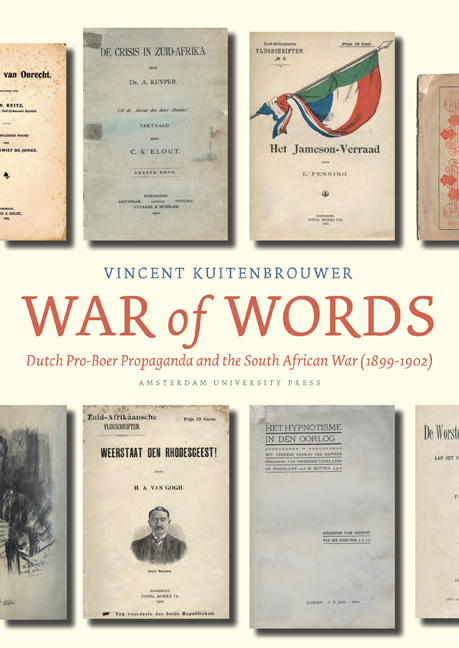Chapter 5 - ‘Dum-dums of Public Opinion’: Pro-Boer Propaganda, October 1899-June 1900
Published online by Cambridge University Press: 15 January 2021
Summary
The public outcry against the South African War is generally seen as the climax of the pro-Boer movement in the Netherlands. The struggle by the Transvaal and the OFS against the British Empire was immortalised on countless pages and in many genres. Historians tend to see this dazzling amount of source material as the result of a unique and temporary phenomenon in Dutch history during which public opinion was captured by a form of mass hysteria. Literary scholars also have trouble interpreting the enormous wave of propaganda that flooded the Netherlands during the war. Writing in the 1910s, the Afrikaner literary critic G. Besselaar thought that only two works of the large collection of ‘gunpowder texts’ were worth reading. At the centenary of the South African War, Ena Jansen and Wilfred Jonkheere compiled a more substantial volume with excerpts from Dutch sources about the conflict, both in High Dutch and in Afrikaans. In the introduction, they rightfully note how the sheer number of texts and the diverse backgrounds of the authors – who ranged from well-known writers in Amsterdam to farmers’ wives in the Karoo – made this corpus quite ‘chaotic’.
The literature on the conflict in the Netherlands was indeed a hotchpotch; different authors wrote about different aspects of the war, expressing themselves in different genres. In the following two chapters, the leitmotivs in this heterogeneous mass of historical sources will be highlighted. This chapter will discuss the coverage of the period up to the occupation of Pretoria, during which the largest battles took place; the following chapter will discuss the coverage of the guerrilla phase of the war. I have argued in the preceding chapters that the lines of communication between the Netherlands and South Africa came under mounting pressure during the conflict but that information from the war zone continued to trickle through. In this sense, there was continuity with the avenues of information that were set up in the 1880s and 1890s. Likewise, the contents of the debate should be seen in line with the feelings of stamverwantschap that took shape during the pre-war period.
First of all, there were ambivalences towards both sides in the war. The Boers seemed to be well adapted to fighting a modern war but at the same time showed fundamental weaknesses in their overall strategy.
- Type
- Chapter
- Information
- War of WordsDutch Pro-Boer Propaganda and the South African War (1899–1902), pp. 179 - 214Publisher: Amsterdam University PressPrint publication year: 2012



